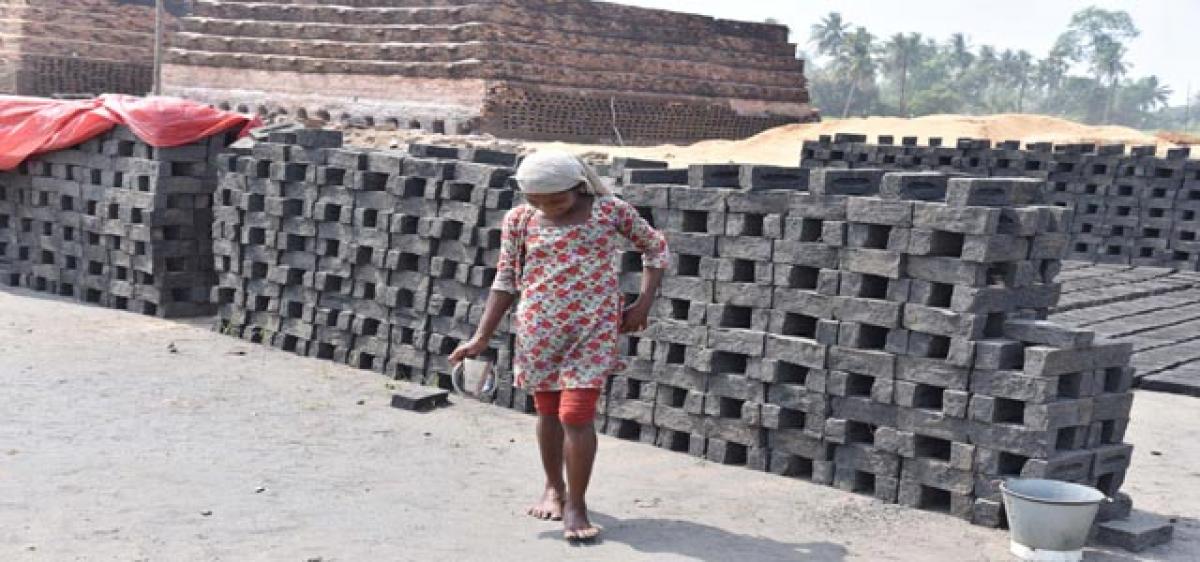Live
- Chanchalguda Jail Officials Say They Haven't Received Bail Papers Yet, Allu Arjun May Stay in Jail Tonight
- BJP leaders present evidence of illegal voters in Delhi, urge EC for swift action
- Exams will not be cancelled: BPSC chairman
- Nagesh Trophy: Karnataka, T.N win in Group A; Bihar, Rajasthan triumph in Group B
- YS Jagan condemns the arrest of Allu Arjun
- Economic and digital corridors to maritime connectivity, India and Italy building vision for future, says Italian Ambassador
- SMAT 2024: Patidar's heroics guide Madhya Pradesh to final after 13 years
- CCPA issues notices to 17 entities for violating direct selling rules
- Mamata expresses satisfaction over speedy conviction in minor girl rape-murder case
- Transparent Survey Process for Indiramma Housing Scheme Directed by District Collector
Just In

Real \"KATTAPPAs are seen in brick kilns across the regions in Visakhapatnam. At a five and-a-half acre brick kiln site located around 50 km from the city, it was just another bright and sunny day.
Visakhapatnam: Real "KATTAPPAs are seen in brick kilns across the regions in Visakhapatnam. At a five and-a-half acre brick kiln site located around 50 km from the city, it was just another bright and sunny day. The workers were brought from various places of Orissa, Jeypore and Srikakulam into the city by a "Sardar" (mediator) from their place into the brick kilns around the city. Most of the Brick Kiln owners hail from Prakasam, Nellore, Chittoor and Guntur whereas the other few partners are from local bodies who looks after the brick kiln business at Arabpalem, Munnagapaka, Ummalada, Tumpala and Seethanagram which are nearby areas of Anakapalli.
The owners of the brick kilns procure a minimum of five acres land on lease from poor farmers and dump the clay mud, coconut peach and ash materials in the yard. They then contact mediators who bring in the workers for the brick kilns. Most of the labourers are from backward regions who are ready to work even on low wages. The brick kilns have however changed the fate of people from Balangir, Jeypore and Balasor (Baleswar) regions of Koraput district of Orissa.
Families mostly from this region comes to the city to work in brick kilns on a six-month contract every year from December to mid May The mediators gives false promises about providing food and accommodation, in addition to education to their children. Believing the words of the mediators, the workers come to the city along with their families (spouse and small kids) to work in the kiln on a contract basis. But after they join their workplace, the mediators disappear with none of their promises materialising.
The management now comes into the picture and pays Rs 15000 to Rs 25000 on a JODA rule (for two members) in advance in accordance with the size of the family. The target and price will be decided by the management who fix the price on every 6000 bricks made by the workers. They receive only Rs 750 a week and very few families achieve the target of making 12000 bricks in a week for which they receive Rs 1500. The payment is made every Friday and Saturday as per the local bazaar schedule.
In that bazaar, the workers purchase farina for the week. If the income is more for the week then they opt for 6 per kg ration rice supplied by the AP government. They also consume mesta and murrypin leaves. A rural medical practitioner who is familiar with Oriya language treats them when workers’ are in a serious condition. The workers are sheltered in 6/4 sized brick huts with no proper drinking water supplied from the same water sources used for mixing the clay at the kilns and other daily use.
Here we come across a very pathetic scene of a 8 year-old boy also helping his family in mixing the clay under the sunny conditions. Another scene is a 12 years old girl carrying the brick cases which is filled with clay and helping her grandfather and father. The entire families work at the kiln so that they can earn more money.
Madhu Atthi, a worker from Balangir said that due to lack of work in their region they are migrating to neighboring states despite the wages being low. They feel that can at least survive by working here and not die of starvation or hunger. He also said that the workers are aware of the mediators deceiving them but at the same time they were also encouraged by the fact that they can make more money in the six months by striving achieve higher targets.
Commenting on this issue, Bala Krishna, Anakapalli CITU and CPM leader, pointed out that while workers don't have any union, the owners of the brick kilns have unions to protect their own interests. “We had filed a complaint with the labour department and also tried to protect the workers many times. But, they have never come forward to support us. The workers have finally become slaves to the management of brick kilns like Kattappa in Bahubali,” he said.
By Phani Suni

© 2024 Hyderabad Media House Limited/The Hans India. All rights reserved. Powered by hocalwire.com







